November 8, 2025 | 07:19 GMT +7
November 8, 2025 | 07:19 GMT +7
Hotline: 0913.378.918
November 8, 2025 | 07:19 GMT +7
Hotline: 0913.378.918
On July 12 in Hanoi, the Party Committee of the Ministry of Agriculture and Environment held a conference to review Party work during the first half of 2025 and to outline key tasks for the second half of the year. The conference took place in the context of the official implementation of the two-tier local government model and the Ministry’s transition to a new organizational structure, which has been in operation for four months.
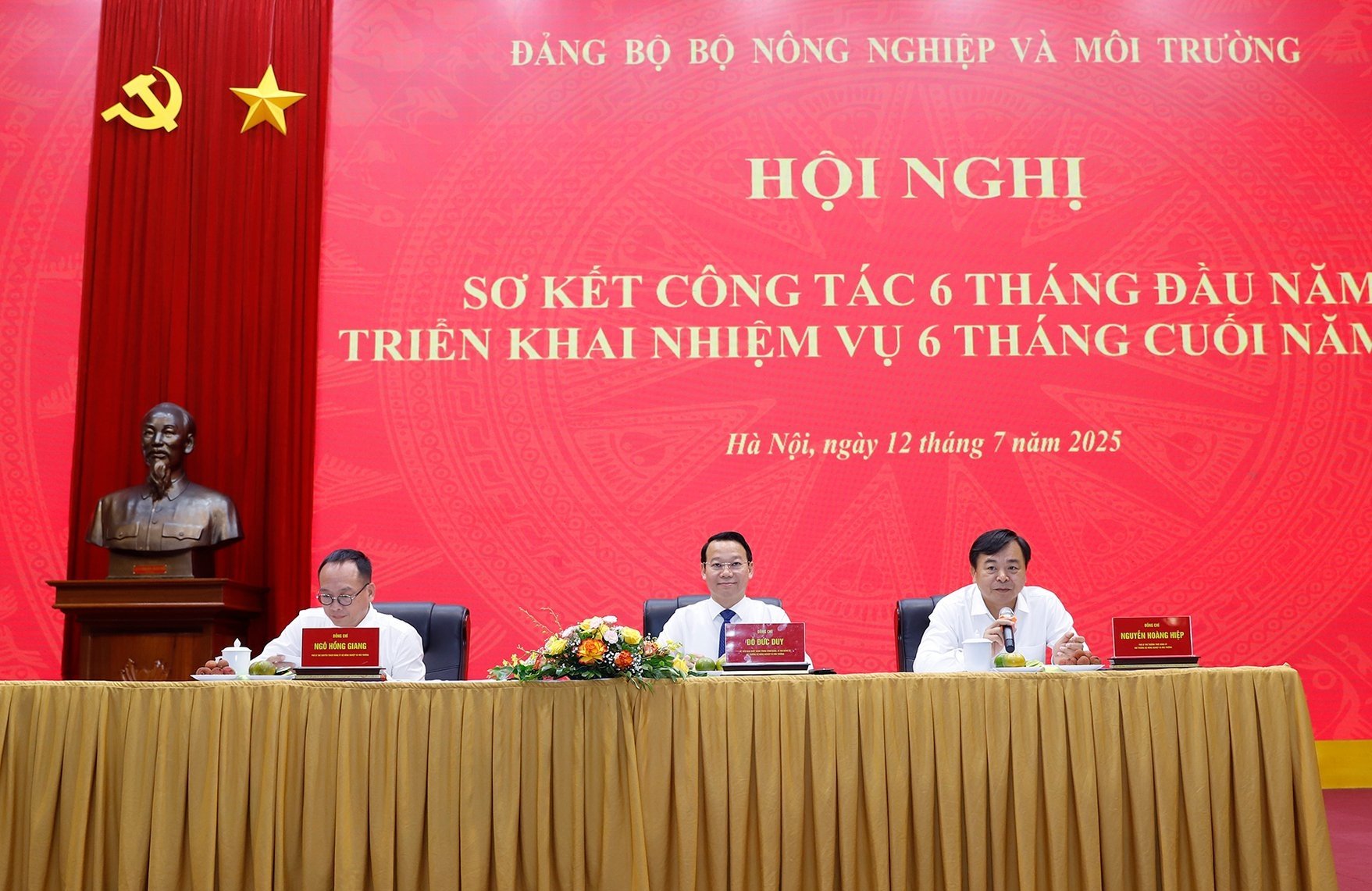
The Party Committee of the Ministry of Agriculture and Environment held a conference to review Party work in the first half of 2025 and to set key tasks for the second half of the year. Photo: Khuong Trung.
In his opening remarks at the conference, Mr. Do Duc Duy, Party Secretary and Minister of Agriculture and Environment, on behalf of the Party Committee's Executive Board, emphasized that despite handling a large workload under a streamlined organizational structure, the Ministry’s Party Committee successfully fulfilled the majority of its political goals and tasks set for the first half of the year.
According to reports from units under the Ministry of Agriculture and Environment, despite a highly volatile global economic and political landscape, including geopolitical conflicts and shifting trade policies, Vietnam’s economy, and particularly the agriculture sector, has maintained positive growth momentum.
The overall growth rate of the sector reached 3.84%, approaching the targeted scenario of 3.9%. Specifically, agriculture grew by 3.51%, forestry by 7.42%, and fisheries by 4.21%. The export value of agro-forestry-fishery products hit 33.84 billion USD, marking a 15.5% increase compared to the same period in 2024.
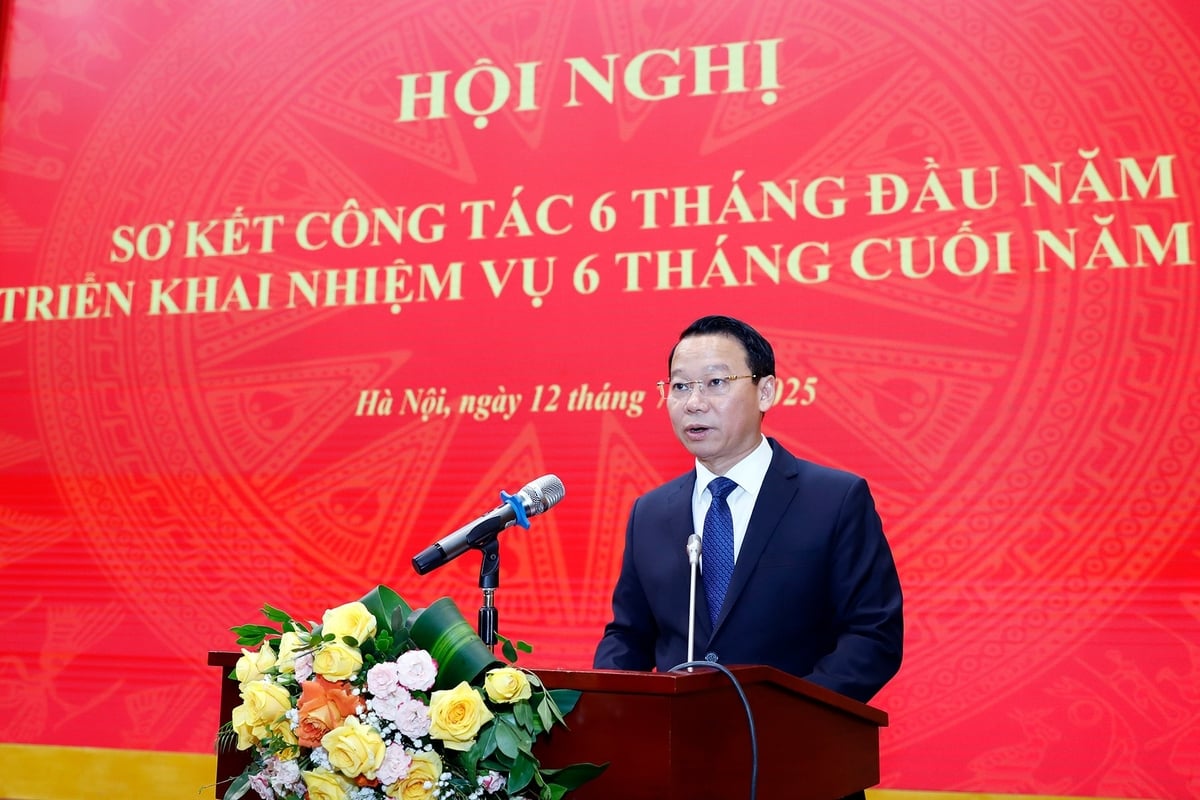
Party Secretary and Minister of Agriculture and Environment Do Duc Duy emphasized that, despite handling a heavy workload under a streamlined organizational structure, the Ministry’s Party Committee successfully fulfilled the majority of its political goals and tasks for the first half of the year. Photo: Khuong Trung.
The Ministry placed strong emphasis on institution building and improving the legal framework, particularly in issuing guiding documents for implementing newly passed laws and resolutions of the National Assembly.Decentralization and delegation of authority to local governments have been thoroughly implemented in alignment with the two-tier local government model.
Following the structural transition, the organizational structure of the Ministry and the entire sector has been streamlined and quickly stabilized, thereby improving operational efficiency and effectiveness. The civil service workforce is gradually being standardized, and administrative discipline has been reinforced.
Digital transformation continues to be a highlight in the Ministry’s public administration reform efforts. The National Land Database has officially been put into operation and is now connected with the national population database in 34 provinces and cities nationwide.
At the same time, the Ministry has actively advised on resolving bottlenecks in land management, investment, and mineral resource governance. It has also accelerated efforts in natural resource management, environmental protection, and climate change response.
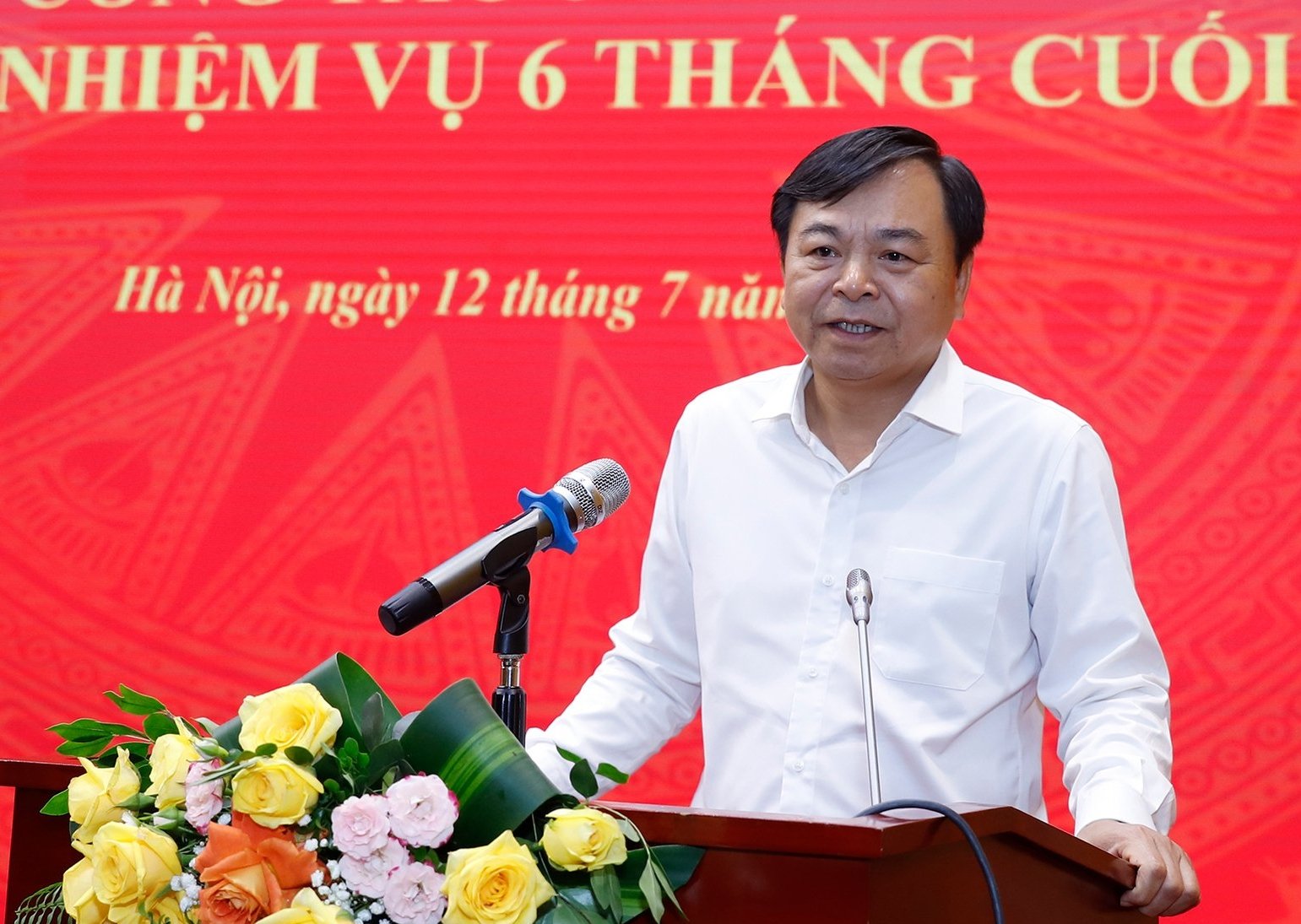
Deputy Minister of Agriculture and Environment Nguyen Hoang Hiep delivers remarks at the mid-year Party work review conference and outlines key tasks for the second half of 2025. Photo: Khuong Trung.
In the field of international integration, the Ministry has continued to broaden cooperation, affirming Vietnam’s role in ensuring global food security and addressing major global challenges such as climate change, environmental pollution, and biodiversity loss.
Party building and strengthening of the political system have been implemented in a coordinated and comprehensive manner. As of July 9, all Party congresses of subordinate organizations had been completed on schedule. This serves as an important foundation for convening the Ministry's First Party Congress in August.
Efforts in communications, mass mobilization, inspection, and supervision have been intensified, while anti-corruption measures continue to reinforce discipline within the Party.
However, the conference also identified several issues that need to be addressed. These include difficulties in certain production and export sectors, delays in implementing some professional tasks, and a lack of synchronization in the application of shared information systems.
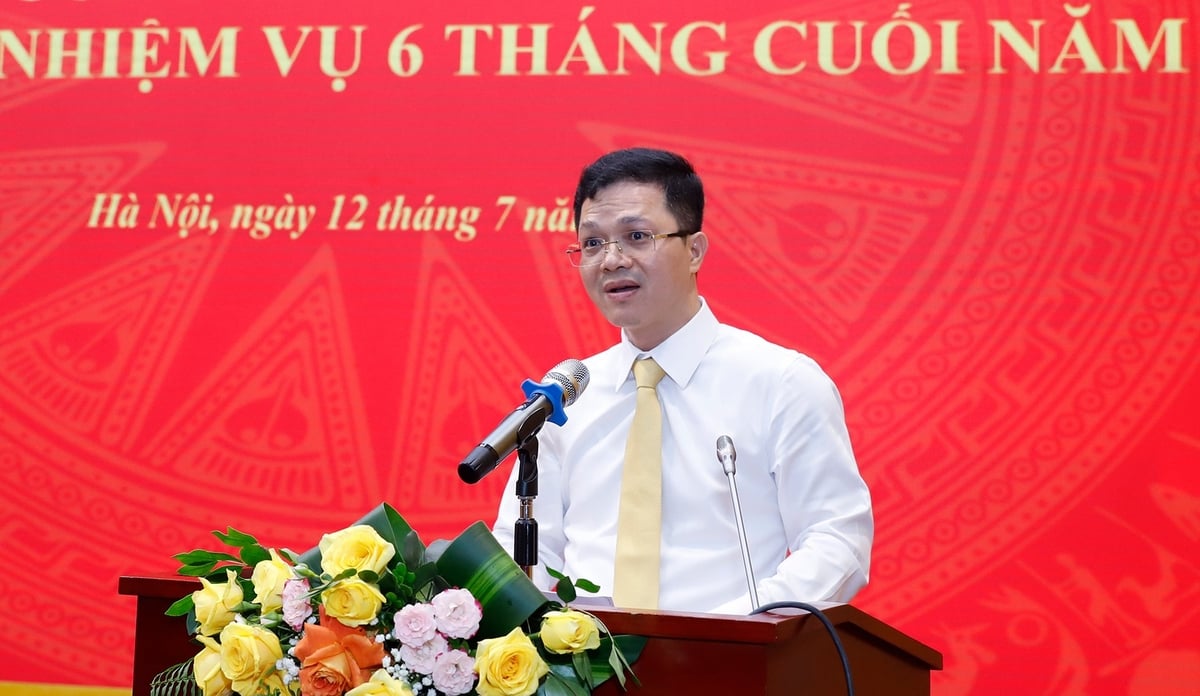
Comrade Nguyen Van Long, Director of the Department of Science and Technology, speaks at the mid-year Party work review conference and outlines key tasks for the second half of 2025. Photo: Khuong Trung.
The causes have been identified as stemming from both objective and subjective factors, including a lack of decisiveness from certain units and some leaders who have not fully fulfilled their roles and responsibilities.
In his concluding remarks at the conference, on behalf of the Party Committee Executive Board, Minister Do Duc Duy affirmed that the entire Party Committee must maintain a high level of focus during the crucial final six months of the year - a decisive period for comprehensively achieving the term’s goals.
He emphasized key priority tasks, including: Strengthening the new Party Executive Committee to ensure comprehensive leadership by the Party organization; Thoroughly preparing for the Party Congress of the Ministry for the 2025–2030 term; Improving institutional frameworks and legislation, particularly the Land Law, the Geology and Minerals Law, and laws related to agriculture and the environment; Supporting the two-tier local government system, especially the grassroots commune level, in carrying out their specialized tasks.
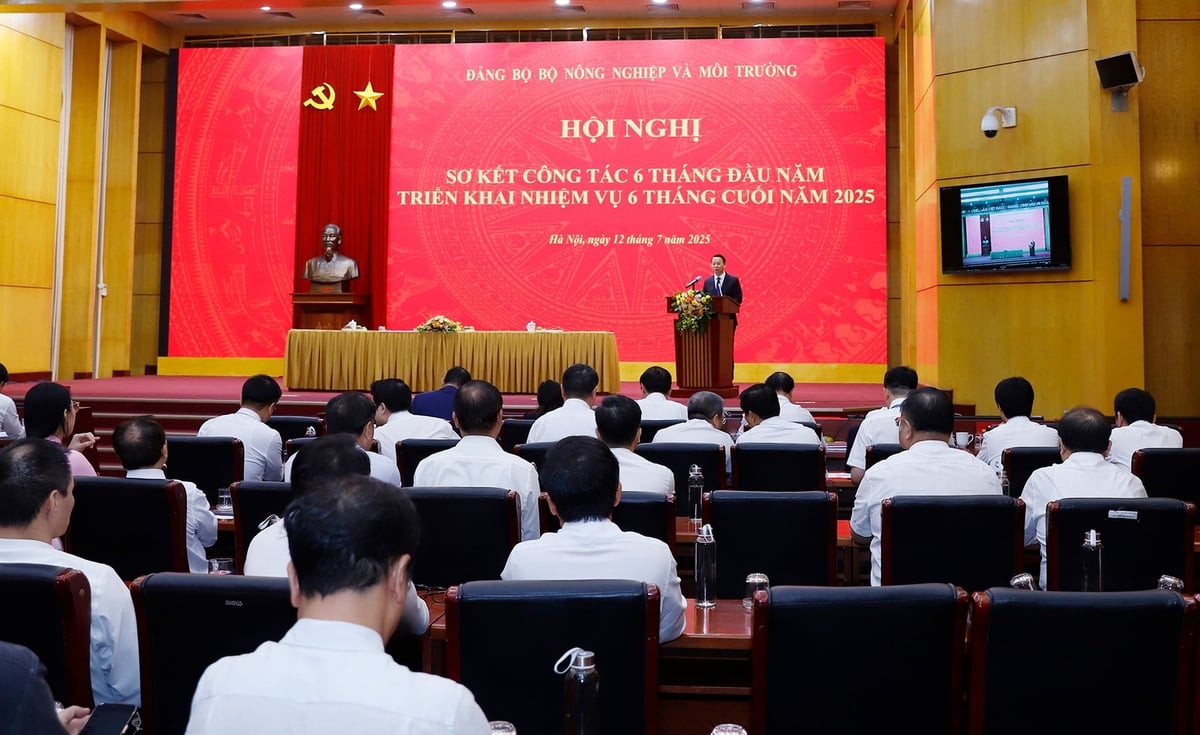
Overview of the conference held on the morning of July 12. Photo: Khuong Trung.
The Ministry is concentrating on organizing and restructuring its apparatus, strengthening the workforce, and addressing labor policies for units undergoing transformation. It aims to ensure growth targets are met, accelerate public investment disbursement, promote science and technology, and advance digital transformation. Additionally, it is committed to enhancing resource management, environmental protection, and efficient use of resources; thoroughly internalizing Party resolutions into practical implementation; promptly addressing emerging issues; and, importantly, tightening Party discipline, strengthening inspection and supervision, as well as screening and developing Party members.
Minister Do Duc Duy stated that the success of the conference exemplifies the spirit of unity, the aspiration for innovation, and the responsibility shared across the entire sector. In the critical final year of the term, the Party Committee of the Ministry of Agriculture and Environment affirms its determination to overcome all challenges and fully accomplish assigned tasks, contributing to the successful implementation of the 13th National Party Congress Resolution.
Also on the morning of July 12, the Third Executive Committee Meeting of the Party Committee of the Ministry of Agriculture and Environment for the 2020 - 2025 term was held.
At the meeting, the Executive Committee reviewed and approved the documents for the First Party Congress of the Ministry of Agriculture and Environment for the 2025–2030 term. The Committee also provided feedback on various matters to ensure thorough preparations for the upcoming Party Congress for the 2025 - 2030 tenure.
Translated by Phuong Linh

(VAN) Authorities in Slovenia have uncovered the presence of paracetamol in non-processed pickles in acid from India.

(VAN) The Ministry of Agriculture and Environment of Vietnam has signed a new Memorandum of Understanding (MOU) with WWF, focusing on nature conservation, green development, and sustainable emissions reduction.

(VAN) Viet Nam's strong commitment to green energy, supported by businesses, scientists, and the public, is a shared national mission.

(VAN) Minister of Agriculture and Environment Tran Duc Thang held a working session with leading global enterprises from the Netherlands and Hung Nhon Group.

(VAN) On November 5–6, the National Centre for Hydro-Meteorological Forecasting (under MAE) and the Norwegian Meteorological Institute co-organized the Marine Forecasting 2025 Workshop in Hanoi, focusing on ‘New Methods in Marine Forecasting.’

(VAN) The two parties will coordinate to promote research, innovation, and sustainable development, as well as enhance public awareness in agriculture and environmental fields across the Mekong Delta.

(VAN) With the theme 'Shaping changes, Building futures', GEF 2025 continues EuroCham’s flagship green initiative, bringing together policymakers, business leaders, and innovators to turn climate ambitions into actionable solutions.